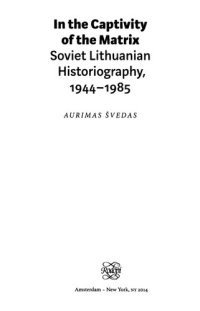
Ebook: In the captivity of the matrix: Soviet Lithuanian historiography, 1944-1985
Author: Švedas Aurimas, Strunga Albina (transl)
- Series: On the boundary of two worlds : identity freedom and moral imagination in the Baltics
- Year: 2014
- Publisher: Rodopi
- City: Amsterdam; New York
- Language: English
- pdf
This book aims to unveil the formation of the Soviet-era Lithuanian historiographical official discourse (from 1944 until 1985, when the last Soviet synthesis was published), to show how it was affected by the mechanisms that created it, and to discuss what kinds of behavioural models historians chose under the duress of this discourse, thereby answering the question of whether the resulting body of unified claims - texts on the history of Lithuania - offer any alternative cases of independent thinking.
In order to realize the afore-mentioned aim of this book, the following questions (divided into five groups) are to be deliberated, which open the way to taking a phenomenological and axiological glance at Lithuanian historiography from the Soviet period:
What place and role in the Soviet state’s social system had the Communist Party afforded the science of history? Which institutions formed the official historiographical discourse, which had to live up to the wishes of the Party elite and maintain its vitality? What are the characteristics of the general ideology and methodology of this official discourse that created the past and the thinking “masks” of the scientists who researched this past? What were the ideological and methodological “errors” made by Soviet-era historians that ended up bringing down the official discourse monolith?
What figures, and which conjunctural or non-conformist actions, challenges and conflicts can be considered fateful in the evolution of Soviet-era historiography? Do the general schemes of political and socio-cultural development in the Soviet period and the turning-points therein apply to the science of history in Lithuania in 1944-1985? What are the most important features of the temporal and spatial models in syntheses of Lithuanian history that were released in the Soviet period? To what extent are these models based on logical thinking, and consistent and adequate in their expression of the details of the Lithuanian nations past? Were attempts made in Soviet-era Lithuanian historiography to creatively apply the ideas of Marx and Engels?
The answering of the questions listed above determined the structure of a prologue, epilogue and five chapters.
In order to realize the afore-mentioned aim of this book, the following questions (divided into five groups) are to be deliberated, which open the way to taking a phenomenological and axiological glance at Lithuanian historiography from the Soviet period:
What place and role in the Soviet state’s social system had the Communist Party afforded the science of history? Which institutions formed the official historiographical discourse, which had to live up to the wishes of the Party elite and maintain its vitality? What are the characteristics of the general ideology and methodology of this official discourse that created the past and the thinking “masks” of the scientists who researched this past? What were the ideological and methodological “errors” made by Soviet-era historians that ended up bringing down the official discourse monolith?
What figures, and which conjunctural or non-conformist actions, challenges and conflicts can be considered fateful in the evolution of Soviet-era historiography? Do the general schemes of political and socio-cultural development in the Soviet period and the turning-points therein apply to the science of history in Lithuania in 1944-1985? What are the most important features of the temporal and spatial models in syntheses of Lithuanian history that were released in the Soviet period? To what extent are these models based on logical thinking, and consistent and adequate in their expression of the details of the Lithuanian nations past? Were attempts made in Soviet-era Lithuanian historiography to creatively apply the ideas of Marx and Engels?
The answering of the questions listed above determined the structure of a prologue, epilogue and five chapters.
Download the book In the captivity of the matrix: Soviet Lithuanian historiography, 1944-1985 for free or read online
Continue reading on any device:

Last viewed books
Related books
{related-news}
Comments (0)